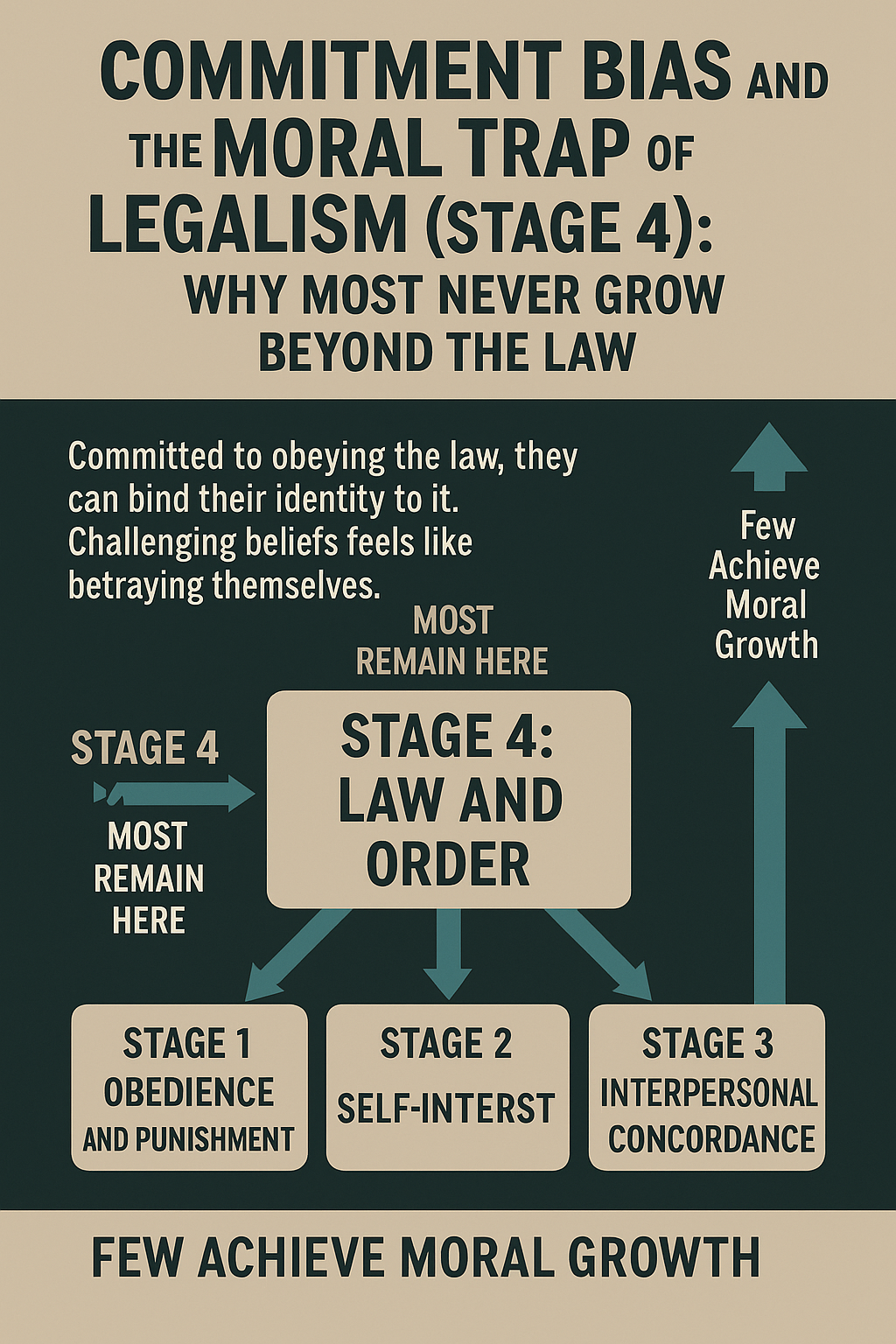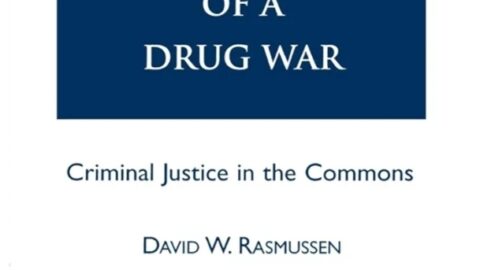I. Introduction: When Obedience Becomes a Prison
Lawrence Kohlberg’s Theory of Moral Development outlines six stages through which individuals progress in their understanding of morality—from blind obedience to universal ethical principles. However, most people never evolve past Stage 4, where morality is defined by law and social order. And one of the major psychological forces keeping them there is commitment bias—the tendency to defend what we’ve already said or believed, even when it no longer serves truth or justice.
This article explores how commitment bias anchors people in Stage 4, why radical moral growth requires humility and unlearning, and how true development demands the courage to be wrong publicly—so we can be right inwardly.
II. Kohlberg’s Six Stages of Moral Development (In Brief)
- Obedience and Punishment (Stage 1) – “I follow the rules to avoid punishment.”
- Self-Interest (Stage 2) – “I do what benefits me.”
- Interpersonal Conformity (Stage 3) – “I want to be seen as good by others.”
- Law and Order (Stage 4) – “I follow the law and authority; it’s the right thing.”
- Social Contract (Stage 5) – “Laws can be changed if they are unjust.”
- Universal Ethical Principles (Stage 6) – “I act according to justice and moral reasoning, even if it defies law or custom.”
III. Stage 4: The Moral Ceiling for the Masses
Stage 4 is where most adults settle. It offers order, stability, and external validation. It answers the question, “What is right?” with:
“Whatever the system says is right.”
But this creates a dangerous moral illusion:
- That the law is always just
- That conformity is virtue
- That obedience is goodness
Stage 4 is moral safety with no compass—and when people publicly identify with it, commitment bias locks them in.
Stage 4 of Lawrence Kohlberg’s Moral Development Theory aligns with legalism, especially when taken to its rigid extreme.
Here’s how they overlap:
- Stage 4 (“Law and Order” Morality):
At this stage, individuals believe that morality means following laws, rules, and authority to maintain social order. Right and wrong are defined by what the system deems acceptable, not by inner ethical reasoning. - Legalism:
Legalism is the belief that strict adherence to law or rules defines moral righteousness. It emphasizes external compliance over internal transformation, and often judges others based solely on rule-following, regardless of context, compassion, or principle.
Shared Traits:
- Obedience is elevated above understanding.
- Rules are treated as moral absolutes, regardless of justice or outcome.
- Conformity is rewarded; questioning is seen as rebellion.
- Moral maturity is stunted—the law replaces conscience.
Why this is a trap:
Legalism (like Stage 4) can feel safe and virtuous, but it prevents people from progressing to higher stages of moral development—where justice, mercy, and universal principles guide decision-making, even when it means defying unjust laws.
Jesus, Socrates, and Gandhi were condemned by Stage 4 thinkers—because they saw the law not as the ceiling of morality, but as its floor.
IV. Commitment Bias: The Barrier to Stage 5 and 6
When someone verbally declares loyalty to the law, a leader, or an ideology:
- They are no longer simply reasoning—they are defending identity.
- To change their mind would require admitting they were once wrong.
- Their commitment becomes not to truth, but to consistency of self-image.
This is why many people:
- Stay loyal to corrupt political systems
- Justify harmful laws or policies
- Mock “radicals” who challenge the order
“They’re not defending morality—they’re defending who they were when they first believed.”
V. The Path Forward: From Cognitive Dissonance to Moral Growth
Growth beyond Stage 4 requires:
- Unlearning what we once declared
- Disidentifying with the law as moral authority
- Allowing truth to humble and re-form us
As Alvin Toffler once warned:
“Tomorrow’s illiterate will not be the man who cannot read, but the one who cannot learn, unlearn, and relearn.”
This quote echoes Kohlberg’s upper stages—where moral reasoning must:
- Move beyond concrete rules into abstract principles
- Evaluate and reclassify information
- Abandon public approval for internal conviction
VI. Why Most Fear Stage 5 and 6
Moral growth often looks like rebellion:
- It questions sacred systems
- It challenges authority
- It speaks against injustice from within the law
This is why Jesus, Socrates, and Martin Luther King Jr. were seen as radicals—they weren’t immoral, they were post-legal. They had advanced to moral reasoning that transcended law because it aligned with truth, not social approval.
But Stage 4 people—anchored in commitment bias—often attack Stage 5 and 6 thinkers as “dangerous,” “disrespectful,” or “divisive.”
VII. Practical Example: A Political Lens
When a citizen publicly supports a policy or leader that later proves unjust, they may:
- Double down to avoid cognitive dissonance
- Mock reformers as “fringe”
- Cling to status quo language (“We must follow the rules,” “That’s how it’s always been.”)
Stage 4 combined with commitment bias turns truth-seekers into threats, and cultural growth into heresy.
VIII. From Law to Light: The Courage to Let Go
To evolve morally is to say:
- “I was wrong.”
- “I believed something harmful.”
- “I now see differently.”
This takes immense courage—because the world rewards consistency, not correction.
But every step into deeper truth is a step out of the crowd and toward conscience.
“The truth does not change according to our ability to stomach it.” – Flannery O’Connor
IX. Conclusion: The Radical Path Is the Only Real Path
If we do not teach students, citizens, and leaders to:
- Think independently
- Unlearn publicly
- Re-evaluate truth regularly
…then we will raise a generation of legalists in moral costume, obedient but blind.
True growth—personal, political, and spiritual—only comes when we confront the lies we once spoke and let the truth remake our identity.
It is not the law that saves us—it is the truth.
And the truth often demands we leave our old selves behind.






